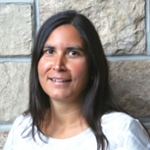
Melissa Arcand
Associate Professor- Address
- 5E78 - Agriculture Building
Research Area(s)
- Biogeochemical cycling
- Nutrient stewardship
- Soil organic matter
- Soil biodiversity
- Soil ecology
- Rhizosphere
Brief Biography
Melissa Arcand is a soil biogeochemist with research interests focused on optimizing plant-soil synergies for the design of nutrient and energy efficient cropping systems. She received received her PhD in Soil Science from the University of Saskatchewan and conducted her post-doctoral research with Agriculture and Agri-Food Canada. Melissa grew up on a farm on the Muskeg Lake Cree Nation in central Saskatchewan. She teaches and is the academic advisor for students in the Kanawayihetaytan Askiy program, designed to train students to work in resource management and land governance in Indigenous communities across Canada.
Department
Research Interests
Education
- Ph.D. (Soil Science), University of Saskatchewan
- M.Sc. (Land Resource Science), University of Guelph
- B.Sc. (Environmental Science), University of Guelph
Selected Publications
Arcand, M.M., Levy-Booth, D.J., and Helgason, B.L. 2017. Resource legacies of organic and conventional management differentiate soil microbial carbon use. Frontiers in Microbiology, 8: 2293. https://doi.org/10.3389/fmicb.2017.02293
Arcand, M.M., Helgason, B.L. and Lemke, R.L. 2016. Microbial crop residue decomposition dynamics in organic and conventionally managed soils. Applied Soil Ecology, 107: 347-359. https://doi.org/10.1016/j.apsoil.2016.07.001
Arcand, M.M., Knight, J.D., and Farrell, R.E. 2014. Differentiating between the supply of N to wheat from above and belowground residues of preceding crops of pea and canola. Biology and Fertility of Soils, 50(4): 563-570. https://doi.org/10.1007/s00374-013-0877-4
Woodley, A., Audette, Y., Fraser, T., Arcand, M.M., Voroney, P., Knight, D., Lynch, D.H., Martin, R.C., MacRae, R. 2014. Nitrogen and phosphorus fertility management in organic field crop production. p. 59-106 in Martin, R.C. and MacRae, R. (eds) Managing Energy, Nutrients and Pests in Organic Field Crops. Taylor and Francis Group.
Arcand, M.M., Lemke, R., Knight, J.D., and Farrell, R.E. 2014. Nitrogen supply from belowground residues of lentil and wheat to a subsequent wheat crop. Biology and Fertility of Soils, 50(3): 507-515. https://doi.org/10.1007/s00374-013-0873-8
Arcand, M.M., Knight, J.D., and Farrell, R.E. 2013. Temporal dynamics of nitrogen rhizodeposition by pea as determined by 15N labeling. Canadian Journal of Plant Science, 93(5): 941-950. https://doi.org/10.4141/cjps2013-050
Arcand, M.M., Knight, J.D., and Farrell, R.E. 2013. Estimating belowground nitrogen inputs of pea and canola and their contribution to soil inorganic N pools using 15N labeling. Plant and Soil, 371(1-2): 67-80. https://doi.org/10.1007/s11104-013-1626-z
Leinweber, P., Kruse, J., Baum, C., Arcand, M., Knight, J.D., Farrell, R., Eckhardt, K.-U., Kiersch, K., and Jandl, G. 2013. Chapter 2 - Advances in understanding organic nitrogen chemistry in soils using state-of-the-art analytical techniques. Advances in Agronomy, 19: 83-151. https://doi.org/10.1016/B978-0-12-407247-3.00002-0
Courses
- AGRC 111.3 Sustainable Soil and Plant Management
- ASKI 101.3 Field Studies in the Environment
- SLSC 816.3 Soil Organic Matters

